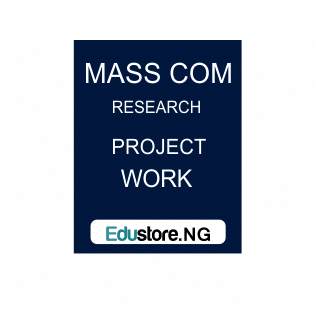CHAPTER ONE
1.1 DEFINITION OF MASS MEDIA
According to Wikipedia the free encyclopedia, Mass media is defined as a diversified media technologies that are intend to reach a large audience by mass communication. It can also be defined as non- personal channels of broadcasting through which a message is passed to the general public principally to the national newspapers, radio and television.
Mass media is also a primary means of communication used to reach the vast majority of the general public. Mass media consists of the various means by which information reaches large number of people such as television, internet, movies etc.
Mass media can also be defined as various channels of disseminating messages to a large wide heterogeneous audience simultaneously. Mass media refers to a technological tools or channels used to transmit the messages of mass communication (Hanson 2010 p.11). It is also a deceptively simple term encompassing a countless array of’institutions and individuals who differ in purpose, scope, method, and cultural context.
Raufu [2011], defined mass media as the modern means of giving information to a large number of people and they are basically used for information dissemination, education, and entertainment of the society. Mass media includes all forms of information communicated to a large group of people from a handmade sign to an international news network.
Mass media as defined by C. Wright Mills ‘The Power Elite [1956] have two important sociological characteristics, firstly, very few people can communicate to a great number, and secondly, the audience has no effective way of answering back. Mass media is the intersection of mass communication, culture and technology. (Giles, 2003 P.7).
According to Oxford Advanced Learners Dictionary, international students’ edition, mass media is designed as information and news such as newspapers, magazines, radio, and television that reach and influence large number of people. Mass media can also be defined as large scale organizations which use one or more of these technologies to communicate with large number of people.
Mass media are the means of public.cornmunication reaching to the large, scattered, heterogeneous, and anonymous audience at the same time. Mass media are the powerful means that do not influence today’s world but also shape the globe of tomorrow.
1.2 FEATURES OF MASS MEDIA
The features of mass media includes the fallowings:
- Mass media produces and distributes symbolic contents, messages, information in
audio, visual or audio visual. - Mass media separate context between the production and reception of information.
- Mass media has a complex and formal organization structure.
- Mass media is comprised of both technical and institutional method of production
and distribution.
- Mass media message are directed towards a large audience.
- Mass media content is shaped according to choice of various targeted receiver.
- Mass media has the present of professional communicator and multiple gatekeepers
such as reporter, photographers, e.tc. - Mass media has a high operating cost.
- Feedback in mass media is not immediate but delayed.
- Mass media participating in communication is both sender and receiver.
- Mass media message are public i.e. they are open to all and the distribution is
unstructured and informal.
1.3 FUNCTIONS OF MASS MEDIA
Mass media has many functions but the first three main functions of mass media include:
. Surveillance function, Entertainment function, Correlation function.
SURVEILLANCE FUNCTION: This is the collection and distribution of information within and outside a particular environment. The information flow is necessary for unity and coherence. Their function is to observe the society closely and continuously, and also warn about threatening action to the people which is likely to happen in future in order to decrease the possible loss.
- ENTERTAINMENT FUNCTION: This is a kind of performance that provides
pleasure to people. The mass media entertain the public by providing
emotional relaxation, intrinsic and cultural enjoyment i.e. provision of
momentary escape from problems and killing boredom. It also helps in
providing amusement and assists in reducing tension to large degree of
The fusion of entertainment and information is called
INFOTAINMENT similarly; the inclusion of education in entertainment
programs is regarded as EDUTAINMENT. - CORRELATION FUNCTION: This function includes the interpretation of the
information about event in the environment, the prescription of conducts and
the comment on social value. This function is also known as correlation of the
part of the society.
OTHER FUNCTIONS OF MASS MEDIA INCLUDES:
Information, Education, Persuasion, Interpretation, Preservation of culture , Linkage.
INFORMATION: The dissemination of information is also one of the major functions of mass media because information is knowledge and knowledge is power. The media offers authentic and timely fact about various event and situation to audience as informative items. The information provided by mass media allows the audience to Know about what is happening around them and how to come up with the truth.
EDUCATION: The mass media provides education in different subject to people of all levels and also they try to educate people directly or indirectly using different form of content Mass media is used as an effective tool for mass awareness.
INTERPRETATION: The mass media does not supply just fact and data but also explanation and interpretation of events and situations. Interpretation functions provide knowledge on news analysis, commentaries, editorials, and columns and these are examples of interpretative content. The interpretative contents are prepared by those journalists who have a vast knowledge on background information and strong analytical ability.
a PERSUASION: This involves making influence on others mind. The media content builds opinion and set agenda in the public mind. Mass media persuades audience using editorial articles, commentaries and it also influences votes, changes attitudes and moderate behavior. One of the things designated to .persuade the audience is advertisement.
- PRESERVATION OF CULTURE: The mass media helps in recording and documenting of culture including norms, values, events and peoples ways of life and other cultural activities. These are important means of preserving the culture for example;- books like Things Fall Apart by Chinua Acliebe, Arrow of God, e.t.c have continued to serve as veritable means of preserving the culture of Igbo people.
LINKAGE: The function of mass media is to join together different element of society that are not directly connected. For example, mass advertising attempts to link the needs of buyers with the products and sellers. Similarly by broadcasting of news of those that suffered from natural disasters, the media can help in collecting Aids and provide the collected Aids to the victims. In this way, media becomes a bridge between different groups who may or may not have direct connection.
Mass media communication can make the people realize their importance, individually and collectively which may lead to increased political activity. Rao , (1966).
1.4 TYPES OF MASS MEDIA
Basically, there are three types of mass media and they are: . Print media. Electronic media . New age media
PRINT MEDIA: This is a medium that disseminates printed materials. It is also refers to as the industry associated with the printing and distribution of news through newspaper and magazines.
It can also he said to be a paper publication circulated in the form of physical editions of books, magazine, journals and newsletters. Print media includes:
. Newspapers
. Magazines
, Booklet and brochures
. Newsletters
. Press releases
Billboards, . Books, e.tc
FEATURES OF PRINT MEDIA
The features of print media are as follows:
The print media like newspapers and magazine gives us an in-depth coverage and analysis of news stories around the world. These stories are permanent and readily available to the common people in times of need. The news stories can read, re read, and retained.
- The timeliness of news in the print media is limited, unlike the electronic
media, they do not give immediate news but it has the luxury of detailed
representation, interpretation and analysis. - A lot of variations are found in print media in forms of hard news, soft
news, features, gossips e.t.c - Print media is an easy medium to spread awareness or advertise to any
particular geographical area. - Print media allows you to choose your space for advertisement, thus, you
can manage your budget and expenses while planning for advertisement.
ADVANTAGES OF PRINT MEDIA
- Flashy magazines are always popular among consumers and are often read
by them for a particular period of time. - Some forms of print media have huge and trusted This is
definitely a great boost to attract readership. - Both media outlets (magazines and newspapers) have a loyal readership.
This can be very useful for advertisers as compared to gain loyal customers
or advertising on the internet. - Magazine and newspapers are always in the eye among the
Magazines are read for a period of a month which brings advertisement. - Advertising through brochures or leaflets depends on the target audience
in print media.
DISADVANTAGES OF PRINT MEDIA
- Placing an advertisement in print media requires a lot of planning and
- There is much limitations when it comes to targeting your audience as
the particular newspaper may not be available to the audience all the - Advertisement might get lost in all the clutter of editorial and ads by
- The life span of newspaper and magazine is very short as people have a
tendency to throw them or keep them aside after one day to read.
The cost incurred can sometimes be expensive considering the medium
you choose.’ s ELECTRONIC MEDIA: This is a kind of media which requires the user to utilize an electronic connection to access it. It is also refers as the media that use electronics or electro-mechanical energy for the end user {audience} to access the content.
It can also be said to be a broadcast or storage media that takes advantage of electronic technology. Electronic media is also known as broadcast media. Electronic media includes:
. Radio
. Television
FEATURES OF ELECTRONIC MEDIA
- They inform, instruct, and advise, but their aim is to entertain the readers.
They are usually read after the news and in leisure moment. - They require the writer to apply his or her imaginations to the facts yet
they are not fiction. - They permit the reporters to use his/her ingenuity to write a story original
in ideas and treatment. - They are usually not cut in make-up, thus, the reporter may use any service
of the fiction writer, suspense, dialogue, description, narration, climax and - Invisible audience: The audiences are not known to the reporters, therefore
they do not have targeted audience in terms of news delivery.
ADVANTAGES OF ELECTRONIC MEDIA
- Speedy transmission: It requires only few seconds to communicate
through electronic media because it supports quick transmission. - Wide coverage: The world has become a global village and communication
around the globe requires a second only. - Low cost: Electronic communications saves time and money.
- Electronic media allows instant exchange of feedback.
- Managing global operation: Due to the advancement of the electronic
media, business managers can easily control operation across the globe.
DISADVANTAGES OF ELECTRONIC MEDIA
- Volume of data: The volume of telecommunication information is
increasing in such a fast rate that business people are unable to absorb it
within relevant time limit. - Cost of development: . Electronic communication requires huge
investment for infrastructural development. - Legal status: Data and information, if faxed may be distorted and will
cause zero value in the eye of law. - Undelivered data: Data may not be retrieved due to system errors or fault
with the technology. - Dependency: Technology is changing everyday and therefore poor
countries face problem as they cannot afford new or advanced
NEW AGli MEDIA: This is the kind of media that helps us with the advent of internet to enjoy the benefit of high technology mass media which is not only faster than the old school mass media:but also have a wide spread range.
internet has also started network internet sites which have redefined mass communication altogether. Sites like Face book, Twitter and YouTube have made communication to the masses all more entertaining, interesting and easier. New age media includes:
. Mobile phones
. Computers
. Internet
.You tube
. E-books
. E-forum
- Clogging
.Website, etc
FEATURES OF NEW AGE’MEDIA
- Digitized: in order to go up in the internet in a manner others can retrieve,
art must be put in a recognizable format. Digitization is accomplished
through encodings for text in various languages, music and videos along
with protocol for exchanging the resulting data between programs and
computer system. - Malleable; nothing is ever perfect and the internet make it so tempting to
improve what you have put up in modern software allows the most
technically naive writer or artists alter their work and show the results
instantly. - Convivial: the internet allows art as mash -ups of contributions and large
and small from many people. A single author may try to maintain, control,
but will always filled the urge to incorporate suggestions he finds
compelling for other people. - Topical: Art that is constantly changing reflect the needs of particular time
and place. Local personalities and fast-breaking news events find their way
into artistic expressions. - Open: In a medium that makes copying so easy, attempt to restrict
distribution are probably not worth the effort-particularly in such effort
prevent the reuse of materials that is one of the most interesting part of the
internet experience.
ADVANTAGES Oi7 UlilV AGE MEDIA
- New media advertising is often less expensive than advertising in
traditional media, - An internet presence and email communication have the potential to
expand a small – businesses customer base exponentially. - The limited scope and time delays characteristics of traditional advertising
- New media option allow not only for instant connections but also for
connecting on a number of different levels. - Business can used video technology both internally and to connect with the
outside world.
DISADVANTAGES OF NEW AGE MEDIA
- Distraction: The way in which social media involvement provided an
acceptable diversion from intellectual pursuit. - Invasion of privacy: advertisers violates users privacy policies.
DOWNLOAD COMPLETE MATERIAL FILE(S) NOW!>>
DOWNLOAD COMPLETE WORK- For Reference Only: Materials are for research, citation, and idea generation purposes and not for submission as your original final year project work.
- Avoid Plagiarism: Do not copy or submit this content as your own project. Doing so may result in academic consequences.
- Use as a Framework: This complete project research material should guide the development of your own final year project work.
- Academic Access: This platform is designed to reduce the stress of visiting school libraries by providing easy access to research materials.
- Institutional Support: Tertiary institutions encourage the review of previous academic works such as journals and theses.
- Open Education: The site is maintained through paid subscriptions to continue offering open access educational resources.






